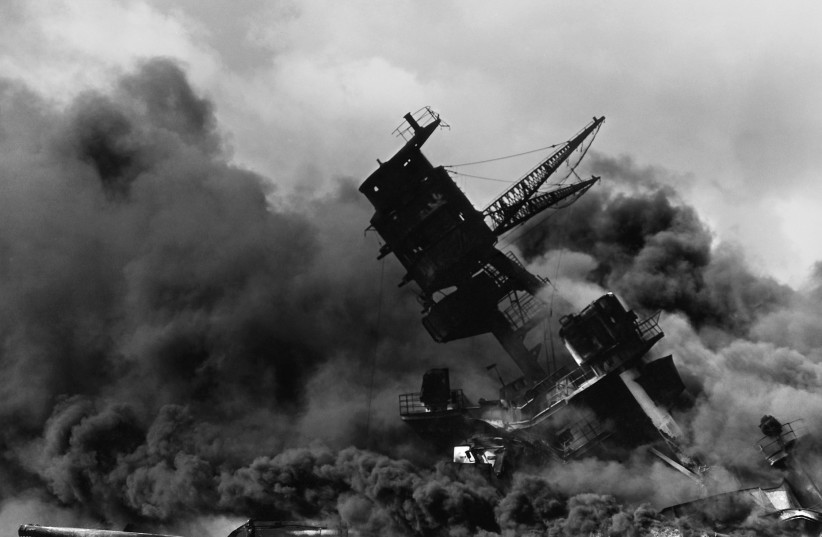A Gaza war ceasefire would be the dangerous equivalent of an Israeli surrender to Hamas, Prime Minister Benjamin Netanyahu said Monday, as he urged the global community to back his country’s military campaign to defeat the terrorist group.
“Just as the US would not agree to a ceasefire after the bombing of Pearl Harbor [in 1941] or after the terror attack of 9/11 [in 2001], Israel would not agree to a cessation of hostilities with Hamas after the horrific attacks of October 7,” Netanyahu said during an English-language briefing to the foreign press.
“Calls for a ceasefire are calls for Israel to surrender to Hamas, to surrender to terrorism, to surrender to barbarism, that will not happen,” Netanyahu stated.
He spoke on the 24th day of the war, which was sparked by Hamas’s massacre of over 1,400 people, many of them children, and the capture of 239 hostages when it invaded southern Israel.
Global sympathy for Israel after the attack has shifted to the Palestinians in Gaza, as Hamas asserts that the Palestinian casualty count is over 8,000. Israel has not provided data on the fatalities, but has said the deaths are from IDF aerial strikes or failed Palestinian rocket launches.

The UN General Assembly called for a ceasefire on Friday and the Security Council was set to debate the matter on Monday afternoon.
Even the United States, which backs Israel’s goals, has called for a humanitarian pause, with US President Joe Biden discussing with Netanyahu on Sunday the importance of basic necessities entering Gaza through the Egyptian crossing at Rafah and the ability of over 400 US citizens to exit the Strip through that passageway.
The State Department said Monday that Hamas is making a number of demands before it will allow people to leave Gaza.
“Just as we believe they ought to release all hostages they are holding, we believe they ought to... let leave all the American citizens and other foreign nationals who are being basically forced to remain in Gaza against their will because Hamas won’t uphold its responsibility to operate its side of the Rafah crossing,” State Department spokesperson Matthew Miller told reporters.
Canada’s Foreign Minister Melanie Joly on Monday reiterated a call for a humanitarian pause, and said there is little time left to get Canadians and hostages out while delivering badly needed aid.
“Four hundred Canadians are trapped in Gaza, they are living in fear and despair... and that is why we need humanitarian pauses, a humanitarian truce, in Gaza,” Joly said in a speech to the Economic Club of Canada in Toronto.
Her comments and those of Miller underscored the growing understanding that foreign nationals trapped in Gaza are being held hostage to the hostilities.
“Time is running out. We need an agreement from all parties to get foreign nationals out, including Canadians. To release all hostages. And to allow food, fuel, and water into Gaza,” she said.
Joly said she had been in contact with Qatar, Israel, Egypt, and the United States every day for the past three weeks.
Tensions over the fate of the hostages grew on Monday with the release of a Hamas video showing three captives, but hope also grew that Israel could secure their release through a ground campaign, as IDF soldiers in Gaza freed one of the 239 captives, Pvt. Ori Megidish.
International pressure builds
Foreign governments also pushed Israel to offer more humanitarian aid to Gaza, with Strategic Affairs Minister Ron Dermer explaining that increased Gaza assistance would enter the Strip in the coming days.
Miller said the US made clear to the government of Israel over the weekend that communications networks in Gaza needed to be restored.
Telephone and Internet communications were partially restored on Sunday after a more than day-long blackout.
British Foreign Secretary James Cleverly said humanitarian aid was trickling into Gaza but the volume needed to be increased significantly.
“We’re working extensively with the Egyptians, with the Israelis, and others to try and have a humanitarian pause, temporary pause so that we can get that humanitarian aid to the people that need it,” Cleverly told Reuters at the British Ambassador’s residence in Abu Dhabi.
Netanyahu said on Monday: “The Bible says that ‘there is a time for peace and a time for war’; this is a time for war, a war for our common future... Today we draw a line between the forces of civilization and the forces of barbarism... It is time for everyone to decide where they stand, Israel will stand against the forces of barbarism until victory.”
Reuters contributed to this report.
